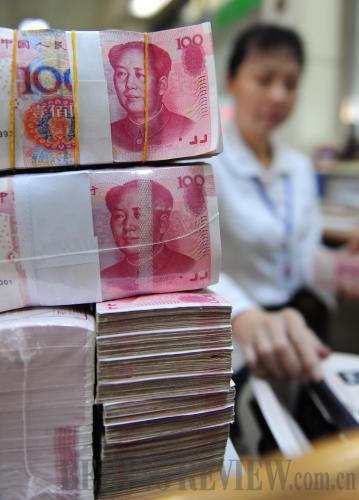|
 |
|
CUTTING OFF CREDIT: Requiring commercial banks to cease loan issuance to some central enterprises could aid the effectiveness of government measures (MENG ZHONGDE) |
The regulator is also arranging measures to prevent risks to authorized real estate enterprises, according to the bank insider. For those enterprises with high operational risks, such as purchasing land at high prices, concurrently engaging in multiple industries, expanding business operations and operating with excessively high debt ratios, the regulator will pay close attention to their operations, and if there are financial difficulties in these enterprises, commercial banks should adopt measures to ensure the timely withdrawal of the loans. Commercial banks will suspend granting or extending loans to property developers with malpractice records.
Questionable M&As
As the unauthorized enterprises face tremendous pressures for cash, those central enterprises whose core business is real estate will soon benefit from a tide of mergers and acquisitions, said industry insiders. For example, a source from China Merchants Property Development Co. Ltd. (CMPD) said the company is paying close attention to the property projects abandoned by other central enterprises, and negotiations with former rivals have already begun.
However, qualified real estate enterprises are not so enthusiastic about reorganizing the property projects of other central enterprises. Among the projects for sale, only a project from China Aerospace Science and Industry Corp. and one from China National Petroleum Corp. have been successfully transacted.
Industrial insiders say central enterprises giving up property projects largely depends on how brisk the market is. A good market leaves little incentive to vacate the property sector. And those central enterprises that are being ordered to leave the real estate market are selling non-profitable or loss-making projects.
"The assets for sale have deteriorating financial statements and a faint future. How can they attract other enterprises to take over and buy them up?" said an industrial insider.
To those subsidiaries with strong profitability and abundant land reserves, their parent companies will certainly be unwilling to sell. What has yet to be seen is the government's effectiveness in forcing certain central enterprises out, keeping other enterprises afloat and ensuring the stability of China's property market.
The 16 central enterprises include:
- China State Construction Engineering Corp. Ltd.,
- China National Real Estate Development Group Corp. (a subsidiary of China Communications Construction Group),
- China Poly Group Corp.,
- Overseas Chinese Town Enterprises Co.,
- China Railway Group Ltd.,
- China Railway Construction Corp. Ltd.,
- Sinochem Group,
- COFCO Corp.,
- China Metallurgical Group Corp.,
- China Minmetals Corp.,
- Sinohydro Corp.,
- China Gezhouba Group Corp.,
- China National Travel Service (Hong Kong) Group Corp.,
- China Merchants Group,
- China Resources (Holdings) Co. Ltd., and
- Nam Kwong (Group) Co. Ltd. | 